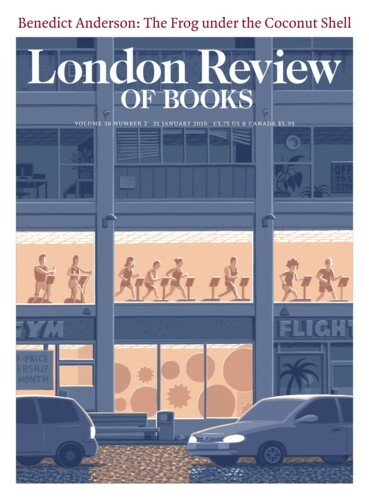When he enters your flat,
he makes his presence felt –
spinning on his axis,
smiling and pert,
a smile on his lips,
a smile on the back of his head!
He offers you his hand –
his surprisingly soft hand,
which pulls yours down
like an old doorbell
on a string. No one recalls
those doorbells nowadays.
Softness and sharpness.
The corner of a sphere.
He surveys the flat.
Words tremble on his lips.
He’s in no rush to get them out –
they might offend.
Finally, they break free:
‘You no longer have a bed.
My congratulations.
You’ve replaced it with a bunk.
My congratulations.
One can refuse all earthly comforts,
but not books,
We’ll have to get rid of the cot.
The next step’s a hammock.
My congratulations …’
He pauses for a moment,
then launches in on me again
with renewed strength:
‘A hammock! But we need to think …
Where could we put the hooks?
There’s no room for hooks!’
Shklovsky rejoices,
‘Can’t even see the walls!
My congratulations!’
Freeze frames, one after another.
Then Shklovsky waves his hand,
walks over to the bookcase
and glides along the spines.
Like the Buddha, he has sixteen hands,
all reaching out to the shelves.
He snatches the book
he needs,
and opens it
on the required phrase,
which immediately enters
his speech, as if
it had been waiting there
for years,
and finally struck lucky.
He reconciles it all –
his world is reconcilable.
His world is rationally built.
The quotes he chooses cling to one another,
well montaged;
but he doesn’t trust them
and, one after another,
closes up the books.
Shklovsky departs
as suddenly
as he’d arrived –
noisily spinning on his axis,
smiling and pert.
An hour later he calls:
‘We must finish our talk. Come.’
I come, find him sitting
with his cane in the corner
and – ‘I’m sorry, still busy’ –
dictating the end of yet another
article to his wife
(one of the three Suok sisters,
Serafima Gustavovna).
This time, a hundred lines.
Another article’s already breathing
down this one’s neck;
one paragraph slips from his hands
like a sliver of soap,
another writes itself.
He finishes, gets up, and walks
across the room, diagonally, back and forth,
so energetically, it is as if
he’s getting ready for the shot put
or the hundred-metre sprint.
Soon he subsides
and sits down by my side,
rubbing his famed bald head
with a soft palm.
‘You know, I realised
some seven and a half per cent
of my potential, but I was conceived
for better than that [pause]
I was conceived
for a full one hundred and twenty.’
It hurt
to hear this.
How I pitied
that poor seven and a half!
‘What do you mean?’ I tried to contradict him.
‘What do you mean, Viktor Borisovich!
Are you feeling all right?’
I walk over to the wall –
not a shelf, but a wall – of his books.
‘One person – you! –
wrote all this.
Not bad, wouldn’t you say?’
A glimmer of a smile, and then again:
‘I see myself more clearly.
So much remains inside
that you can’t see.
Life turned out strangely:
seven and a half per cent
of a grandly conceived life.’
He avoided the word ‘genius’,
but allowed himself ‘grand’,
‘huge’, and so forth.
He’s talking about life.
Today he offers up
a new – the ninth, by my count –
version of his participation
in the October Revolution.
(He returns to this topic often
and, seemingly, without regret,
but it torments him.)
The version with Hetman Skoropadsky,
whose car’s petrol tank
Shklovsky filled with sugar.
He charges into his story,
into history,
but tires of his own fervour,
his own intensity,
аnd falls silent.
Then he gets up, and firmly
shuts the door, and – quietly,
into my ear:
‘In 1921 or 22,
Gorky admitted to me sadly
what Lenin had told him in strict confidence:
“The experiment has failed.”’
Grateful to Shklovsky
for showing such trust in me,
I bowed to him in silence.
We both fell silent.
Without a word, he raised
his finger to his mouth
and looked at me sternly.
It was past midnight.
My day with him was over.
And we had other conversations,
other years.
One day, in winter, I bumped into him
in the courtyard of our building.
Cloaked in dusk
and a long coat fringed with frost,
arm in arm with his grandson.
We stop and Shklovsky tells me
quietly, but clearly:
‘Remember, we are on our way out …
We are on our way out,’ he said,
and I recalled the seven and a half
percent, the wall of books,
all written by a man
who lived
in times that were hard to bear.
Send Letters To:
The Editor
London Review of Books,
28 Little Russell Street
London, WC1A 2HN
letters@lrb.co.uk
Please include name, address, and a telephone number.

